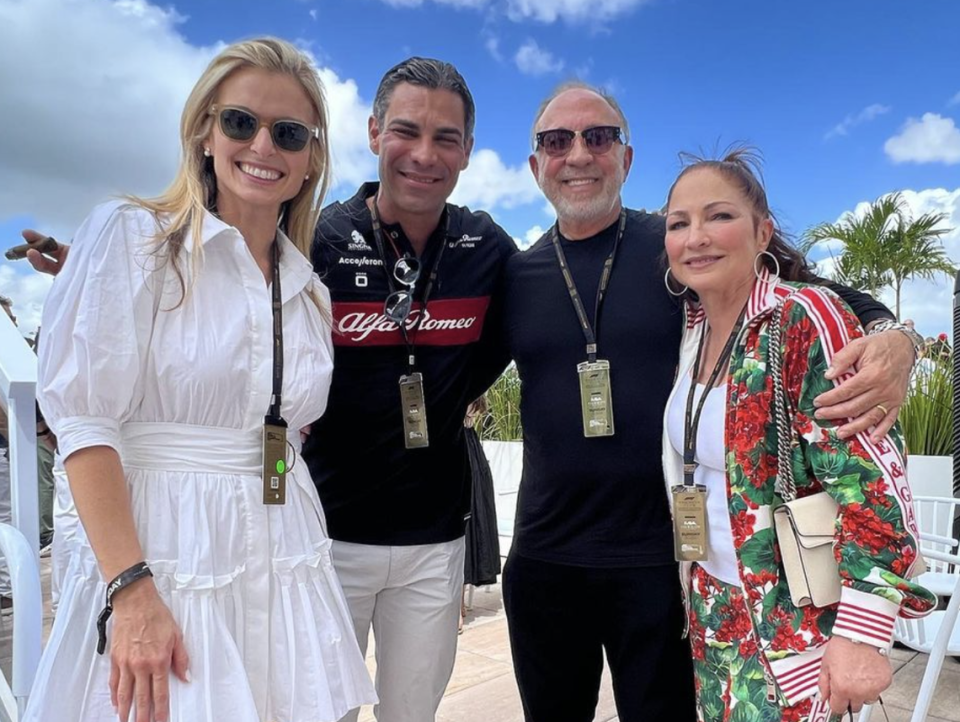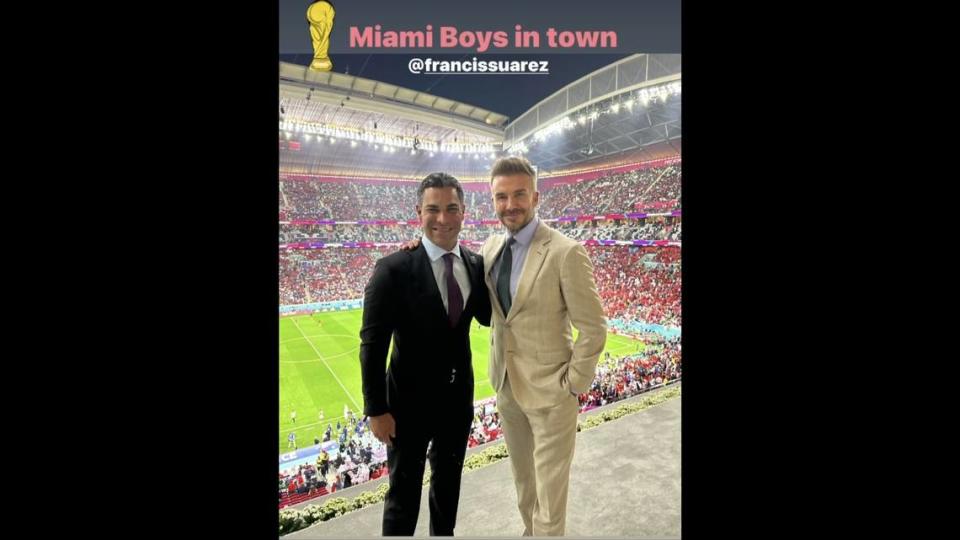Francis Suarez, Ken Griffin say Miami mayor repaid $14K for Miami Grand Prix events
- Oops!Something went wrong.Please try again later.
- Oops!Something went wrong.Please try again later.
In his first public appearance at City Hall after dropping out of the race for the Republican presidential nomination, Miami Mayor Francis Suarez addressed questions related to his five-figure Formula One Miami Grand Prix weekend, the subject of recently filed ethics complaints.
Outside his office during an ongoing budget hearing Saturday, Suarez said he paid a total of $14,000 to cover the cost of F1-related event tickets provided to him by hedge fund executive Ken Griffin.
It was the first time Suarez offered any specific details on what he did to comply with ethics rules intended to protect against conflicts of interest that prohibit the mayor from taking free or discounted tickets — or any other gift valued over $100 — from people who have business before the city.
Griffin’s company, Citadel, has lobbyists registered with Miami as he moves its headquarters to the city.
The law allows a 90-day grace period to repay the full cost of any gift from a prohibited source.
But the figure Suarez provided is thousands short of the actual cost of all the F1-related events he and his wife, Gloria, attended from May 5 to May 7 when the Grand Prix was in town that weekend. Those included three days in the VIP Paddock Club for Suarez, two for his wife, and three $3,000-per-plate dinners at Carbone Beach — two nights for the mayor and one for his wife.
He refused to provide documentation detailing his repayment to Griffin.
In response to the new details, Citadel attorney Brooke Cucinella said Griffin invited the mayor and his wife to only one dinner each and one day at the track — and that the cost was fully covered by the repayment Suarez detailed.
“Anything that happened here was done consistent with the ethical standards, rules and expectations,” Cucinella said
Suarez did not say who paid for the passes for the other F1 events he and his wife attended. “What other days?” Suarez said when asked.
Under Florida law, Suarez would have until the end of this quarter, Sept. 30, to report who footed the rest of the bill if it was anyone outside of his immediate family.

With thousands of dollars of admissions still unaccounted for, Suarez — who is separately under criminal investigation for his business relationship with local developer Rishi Kapoor — is now the subject of a complaint being reviewed by the state ethics commission.
If found legally sufficient, the ethics complaint could trigger a deeper investigation into Suarez’s attendance at various high-priced sporting events, where he has been photographed with an assortment of lobbyists and others seeking various approvals from the city government.
Elected officials can face fines, suspensions and even removal from office for violating Florida’s ethics laws, which require quarterly disclosures of any gift over $100 and prohibit elected officials from accepting anything of value from lobbyists or their employers and city vendors. Under the same law, the person giving a prohibited gift can also be stripped of the right to lobby the city for up to two years.
After months of silence on the subject, Suarez offered the first, limited details regarding his repayments for F1 tickets following a tense interaction with a Miami Herald journalist in a corridor overlooking the commission chambers, where the public budget hearing was underway.

During that incident, the mayor attempted to snatch the phone out of a reporter’s hands as she recorded his reaction to a question about the ethics complaint. A sergeant-at-arms – Suarez’s taxpayer-funded bodyguard — intervened, stepping in front of the mayor while simultaneously acknowledging reporters’ right to record.
When Suarez again approached reporters to address questions about his repayment to Griffin, he declined to say when the transaction occurred or whether it was made before or after the Herald started asking questions about ethics rules.
“I paid back Ken Griffin, I believe, it was $8,000 for the [F1] tickets, and I believe for Carbone it was $6,000,” Suarez said.
In July when the Herald first reported on the exclusive F1 invitation, Citadel spokesperson Zia Ahmed told reporters that Griffin had provided Suarez and his wife tickets to the “Formula 1 event” that “took place over a weekend.” Later, after the Herald published the story, Ahmed said he had been referring only to invitations to Sunday’s race and Saturday night at Carbone Beach.
On a Zoom video call, Ahmed showed the Herald a May 5 email from Ticketmaster that showed Griffin transferred two Sunday, May 7, Paddock Club tickets to “Mayor Suarez.” He also showed a May 16 invoice to Griffin showing the one-day tickets cost $4,000 each.
Ahmed said he was unaware of who, if anyone, might have invited Suarez to the other F1 viewing days prior to Sunday. Under Florida law, Suarez would have until the end of this quarter, Sept. 30, to report gifts received in May.
Photos posted to Instagram show Suarez at the track, sporting Paddock Club passes, which were a different color each day: gold on Friday, blue on Saturday and steel gray and gold on Sunday. Three days in the Paddock Club for Suarez alone would have cost in excess of $10,000.
The mayor’s spokesperson, Stephanie Severino, also declined to answer questions about who paid for Suarez’s racetrack attendance on Friday and Saturday and his wife’s on Saturday.
“The Mayor has responded [to] The Miami Herald’s questions about Formula 1 on a multitude of occasions and will be providing no further comment about the topic at this time,” Severino said in a statement.
An Ethics Inquiry
In July, Miami Democratic activist Thomas Kennedy filed a complaint with the Florida Commission on Ethics, urging the agency to investigate Suarez’s F1 appearances for potential violation of gift laws.
The complaint also mentions Suarez’s 2022 trip to the World Cup in Qatar, where the mayor was pictured in a box with registered lobbyist David Beckham, whose recent bid to build a Major League Soccer stadium on city land was successfully championed by the mayor. Suarez never filed a gift disclosure detailing the trip. Nor did Suarez file a disclosure for his pit-access passes to F1 last year.
Suarez has not responded to the Herald’s questions regarding the other events mentioned in the complaint.
Kennedy also filed the same complaint with the Miami-Dade Commission on Ethics and Public Trust, which dismissed the case Friday after it was found to be legally insufficient in closed session.
In the lead-up to the hearing, the general counsel for the Miami-Dade ethics commission, Loressa Felix, told Kennedy in an email that she planned to recommend dismissal of his complaint due to a provision in the county code requiring the complainant to have personal knowledge of an alleged ethics violation. Kennedy’s complaint was largely based on news stories.
But the commission’s investigators can still initiate their own inquiries, Miami-Dade ethics officials told the Herald in a statement, including investigations based on media reports.
Johan Dos Santos, an attorney for Kuehne Davis Law who represented Suarez in the Friday hearing, said he supported the recommendation for dismissal and had no further comment on the allegations in the complaint.

Kennedy said he is critical of the personal knowledge clause, which seemingly limits the number of people who could file a complaint over ethics violations.
“It’s like the fox guarding the hen house,” Kennedy said. He said the rule, which has been on the books since 1997, seemed “designed to disallow your average Miami resident, who is not politically connected, from using these mechanisms to hold the powerful accountable.”
Kennedy’s complaint is still under consideration at the state level, where there is no personal knowledge requirement unless the complaint is filed within 30 days of an election. It has not yet been brought before the commission.

